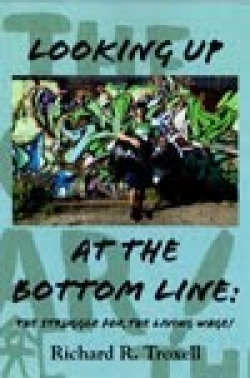Looking Up at the Bottom Line
The Struggle for the Living Wage!
Richard R. Troxell brings new life to discussions of wage labor and unemployment in America in Looking Up at the Bottom Line. A longtime anti-poverty activist who has lived through the marginalization familiar to war veterans (in his case, Vietnam), including losing a place to live himself, Troxell provides a perspective that is explicitly necessary to understanding what it will take to end homelessness in the US.
As a believer in capitalism, Troxell’s arguments for the development of a Universal Living Wage (ULW) center on a fair and decent income for wage earners. He is insistent that the taxpaying population should not be responsible for subsidizing the incomes of working people through programs like food stamps and rental subsidies. Instead, he presents a method by which a ULW would be determined for and applied to county-sized areas across the country; this program would replace the Federal Minimum Wage with a pay structure more in line with the local costs of living, and would be indexed specifically to the price of basic rental accommodation.
Troxell offers a good example of late twentieth-century activist academics, populating his theoretical arguments with personal stories and mini-biographies of homeless people he knows. These ‘faces’ of poverty make it clear that the very real pain and struggle the author has personally seen and experienced inform and drive his work. Over and over again the reader is reminded of the consequences of financial insecurity, and is shown how homelessness happens—often as a result of systemic inequities, holes in the continuum of care needed to support recovery from addiction and reintegration into the workforce, and underfunding of basic services (specifically health care) for the poor. He argues that the money spent on the programs that currently exist is inadequate, and suggests that these services would be better funded if the pool of livable income-earners (hence, taxpayers) were to be broadened. If every person who is willing and able to work a forty-hour week could earn a living wage, he proclaims, the demand for such services would diminish while the funds available to provide them would increase.
There exist a few important areas of modern economics which factor heavily in the contemporary landscape of poverty and employment which the book does not analyze to a great extent: both consumer debt and subprime mortgages disguise poverty in ways that do not always manifest explicitly in homelessness, but could certainly be positively effected by a program like the ULW.
Though Troxell does consider the balance of justice vs. profit in the eyes of legislators, speaking from his own attempts to make small but potentially great improvements in his community, he continues to put his faith in legal and economic institutions, i.e. government and business. Despite his experiences, he asserts that the arguments for legislating a ULW are compelling enough to eventually overcome the influence of profit. If the goal is in fact to produce healthy, vibrant and self-sustaining communities, Troxell’s campaign makes a great deal of sense.
Reviewed by
Patty Comeau
Disclosure: This article is not an endorsement, but a review. The publisher of this book provided free copies of the book and paid a small fee to have their book reviewed by a professional reviewer. Foreword Reviews and Clarion Reviews make no guarantee that the publisher will receive a positive review. Foreword Magazine, Inc. is disclosing this in accordance with the Federal Trade Commission’s 16 CFR, Part 255.

